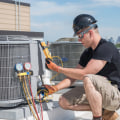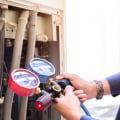When considering AC Repair in North Charleston SC, there's a surprisingly simple formula that's widely used in the HVAC industry to evaluate the best use of your money. Simply multiply the age of the unit by the cost of repairs. According to the Department of Energy, the average lifespan of an air conditioning system in the United States is 15 to 20 years. However, in Florida, the system's life expectancy can be much lower. Here we use our air conditioners almost all year round. In addition, the units are exposed to high levels of humidity, salt water and sulfur, which take their toll over time.
These factors result in an average lifespan of around 10 to 12 years. If you swap your 15-year-old 12 SEER unit for a 16-year-old SEER2 unit, you're facing potential savings in cooling costs of 40% per year*. In most cases, the operating efficiency of an air conditioner decreases over time (or due to poor maintenance, see above). Therefore, after fifteen years, your 12 SEER air conditioner may operate close to the 10 SEER level.
This means that you could save about 68% a year in cooling costs if you switch to a 16 SEER2* system. Upgrade to a system with an even higher SEER2 rating and your potential savings will increase. A professional can provide you with detailed details about your unit's problem and even help you evaluate if a repair or replacement is a better idea. At the moment you may only have a simple repair on your hands, but as soon as it starts to leak, you probably won't be able to repair it.
Not only can investing in a newer unit save you the headaches that come with frequent visits from an HVAC technician, it can also save you money in the long run. If you start to notice any of these signs above or other “weird things” that are happening with your air conditioning system, contact Ready & Able to repair or replace your air conditioning system. In most cases, you can repair the air conditioning unit instead of replacing it if you have any of the following problems. In either case, the opinion of a professional is crucial in determining if you should repair or replace your air conditioning unit.
However, your plans change when the HVAC technician tells you that the air conditioner needs a major repair. Even if the cost isn't in the thousands, you'll have to consider how often you spend money to repair the unit, since that money builds up over time. However, no matter how much preventive maintenance you put into your HVAC system, there comes a time when repairs are no longer enough and it's time to replace it. If you're wondering if your HVAC system needs to be replaced, a cost-benefit analysis can help you decide if repairing your old unit is as economical as simply replacing the unit completely.
Older HVAC systems, as they age, naturally start to struggle to maintain a consistent temperature in your home. Before investing in a new HVAC unit, you may want to check your house and your HVAC unit for costly air leaks. Now, while you can repair your unit, just as you continuously spend money to repair an old car, it may be better to buy a new one at some point. Many homeowners take pride in having their entire home and want air conditioning equipment that matches the care they provide for their yard and home.
Make the most of your next meeting with an HVAC professional with these 10 tips for an in-home appointment.


